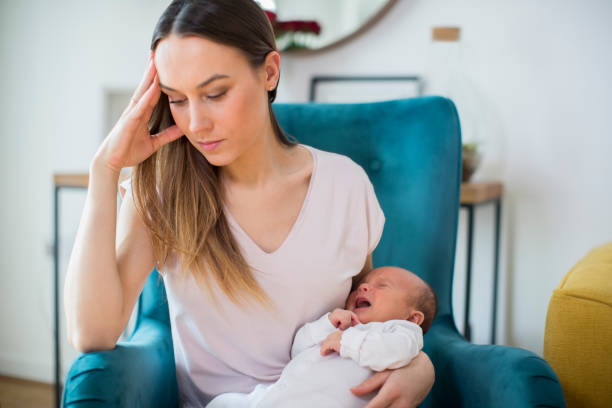Welcoming a new baby into the world should be joyful and thrilling, but for some moms, the period after childbirth can be overshadowed by a profound sense of melancholy and despair. This condition, known as postpartum depression (PPD), may be extremely difficult for new moms and their families. Furthermore, when mixed with addiction, it becomes a complicated and crippling condition that needs careful thought, empathy, and thorough remedies.
Postpartum depression: a quiet battle
Postpartum depression is a clinical depression that arises shortly after childbirth, usually within the first few weeks or months. PPD is a more significant and long-lasting mental illness than the baby blues, a frequent and less severe disorder affecting up to 80% of new moms. PPD symptoms can range in severity and include chronic melancholy, despair, intense weariness, changes in eating and sleep habits, and a loss of interest or pleasure in things the new mother used to love. Postpartum depression treatment centers give women struggling with PPD, which may take an emotional toll, making it difficult for moms to bond with their newborns and care for themselves and their families.

The relationship between postpartum depression and addiction
Addiction, whether to alcohol, drugs, or other substances, frequently coexists with mental health issues such as depression. Some women may feel compelled to self-medicate with medications that give brief comfort from emotional suffering due to the hardships of new parenthood. This is a problematic approach since it can lead to a vicious cycle of addiction and aggravate the situation.
Several variables contribute to the interaction between PPD and addiction:
Stigma and shame: Many women are embarrassed to acknowledge they have PPD, let alone an addiction. They may avoid therapy at postpartum rehabilitation centers because they fear being judged or stigmatized by society.
Self-medication: Some moms may turn to drugs to deal with the intense feelings and anxiety associated with PPD. They may assume that narcotics provide immediate relief from their emotional agony.
Lack of emotional support: A lack of emotional, social, or practical support can exacerbate PPD. Addiction as a coping technique is more likely in mothers who feel alienated or unsupported. Postpartum rehabilitation centers provide emotional support to struggling mothers.
Hormonal changes: Hormonal variations during and after pregnancy might influence a woman’s mental health. These alterations may also raise vulnerability to addiction.
Genetic predisposition: Both depression and addiction are influenced by genetics. A family history of these diseases might enhance the probability that a new mother would experience them all simultaneously.
Mothers with PPD and addiction face difficulties
Combating PPD and addiction at the same time has distinct challenges:
Access to care: Many women experience difficulty receiving proper healthcare at postpartum depression treatment centers, mainly if they reside in underdeveloped regions or do not have health insurance. PPD and addiction both require specific therapy.
Mothers with addiction problems frequently face stigma and prejudice within the healthcare system, making it even more challenging to seek help and treatment.
Concerns about child custody: Some moms are concerned that receiving addiction treatment at the postpartum depression treatment center would result in losing control of their child, causing them to postpone seeking assistance entirely.
Early interventions: There is a lack of understanding and education concerning PPD and addiction among new moms, which can limit early intervention and assistance.
Co-occurring disorders: The complexities of treating PPD and addiction necessitate a multidisciplinary approach at postpartum inpatient treatment centers, which may not be readily available in many places.
Solutions and support
While the road to recovery from PPD and addiction may appear complicated, it is critical to remember that aid and support are accessible. Here are a few solutions and support systems that can make a big difference:
Integrated care: Highly successful integrated treatment regimens targeting PPD and addiction. These programs include mental health therapy, treatment for addiction, and parenting and family relations counseling.
Coping strategies: Individual and group therapy sessions offer moms a safe area to explore their feelings, acquire coping strategies, and establish a support network.
Medication-assisted treatment: Medication may be provided in some circumstances to treat treatment for addiction and depression. This should be done under the supervision of a medical practitioner.
Peer support groups: Joining support groups for moms facing similar issues can help lessen feelings of loneliness while providing practical guidance and emotional support.
Family support: It is critical to encourage family engagement and understanding. Family members may play an essential role in assisting moms on their road to recovery.
Education and knowledge: It is critical to raise understanding regarding the co-occurrence of PPD and addiction to decrease stigma and support early intervention. Teaching these concerns should be prioritized by healthcare practitioners and communities for treatment for addiction.
Legal safeguards should be put in place to guarantee that seeking addiction treatment does not inevitably result in the removal of a mother’s child. Legal protection and assistance for moms in recovery can aid in preserving family relationships.
Conclusion
Postpartum depression and addiction are complex, but the battle becomes even more complicated when they collide. Approaching these difficulties with empathy, compassion, and dedication to provide the appropriate assistance and therapy is critical.
Mothers suffering from PPD and addiction should not feel isolated or hopeless. They may begin on a path to recovery, heal their emotional scars, and create healthy, loving connections with their children with the correct resources, postpartum depression medications, and a supportive community. It is a difficult road that may lead to a happier, healthier future for women and their children.